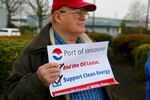Port of Vancouver commissioners passed a significant energy policy shift that shuts the door on any future bulk fossil fuel terminals.

Port of Vancouver commissioners passed a significant energy policy shift to oppose future bulk fossil fuel terminals.
Molly Solomon / OPB
By a vote of 2 to 1, commissioners laid out a new statement: “the port chooses not to pursue new bulk fossil fuel terminals on port-owned industrial property.”
For the past several weeks, dozens of environmental activists have crowded board meetings, urging commissioners to pass a new policy taking a stance against future fossil fuel projects.
"I want to thank you for giving the necessary due diligence to the proposed resolution of the renewable and clean energy policy and most importantly for listening to all concerns, including those of the community," Fruit Valley neighborhood resident and recent Goldman Environmental Prize winner Linda Garcia said before the vote.
"This is your chance to put Vancouver and the port on the map to show the rest of the region and the world that clean and renewable energy projects are sustainable," she added.
After hearing more than an hour of testimony, port commissioners made a few amendments to the draft statement. They eliminated the phrase “international export” after concerns were raised that a company could export bulk fossil fuels domestically. They also changed the language and removed the word “current” when describing port-owned land, in case the port was to acquire new parcels in the future.
The policy statement is a drastic change from where the Port of Vancouver was six years ago when it was courting Tesoro-Savage to build what would have been the nation's largest oil terminal at its dock. Last January, Gov. Jay Inslee rejected the Vancouver Energy project.

Vancouver Port Commissioners Eric LaBrant and Jerry Oliver.
Molly Solomon / OPB
But it spurred a wave of action from environmental groups and helped elect two commissioners, Eric LaBrant and Don Orange, who both campaigned against the fossil fuel industry and opposed the terminal.
“There were a number of folks in the community that wanted to ensure that the Port of Vancouver would not eagerly pursue another Vancouver Energy-type of project,” said Ryan Hart, the port’s chief external affairs officer.
Hart said the commissioners spent months crafting a policy that commits to environmental stewardship while balancing economic development. Current tenants are protected from the new policy and won’t be impacted, port officials said.
“It’s one of the strongest statements we’ve seen from any port in terms of setting the direction,” Columbia Riverkeeper conservation director Dan Serres said. “I think it's a way for the community to hold the Port accountable to this direction that they're headed.”
The statement is a big step toward a cleaner energy future at the Port of Vancouver and makes it one of the few ports in the region to take a strong stance against fossil fuel infrastructure.
“The Port of Vancouver actually is getting out ahead of other ports, certainly in the region and probably nationally,” said Eric de Place, a director at the Seattle-based environmental think tank Sightline Institute. “To take an assertive and I think very positive oppositional stance against fossil fuels, that should be commended.”
Not everybody applauded the Port’s new stance. Deken Letinich with Vancouver Laborers Local 335 said this could be a hit to the trade industry and discourage businesses from bringing industry – and jobs – to southwest Washington.
But other union workers sided with environmentalists, including local ILWU president Cager Clabaugh. He said his longshoremen were busy unloading a historic amount of wind turbine parts from a shipment that came in Monday night.
“I think we can find other things to build down here at the port for the building trades,” Clabaugh said. “There's a lot of commodities searching for a home that aren't what I consider a dying commodity, which is fossil fuels.”